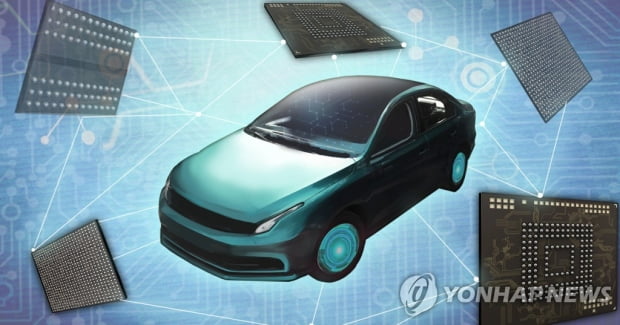The 2nd meeting of the Future Vehicle-Semiconductor Council… Government, emergency commercialization support

It was found that major semiconductor foundry (consignment production) companies in Taiwan, such as TSMC, increased the production rate of automotive semiconductors, which suffered shortages, by 2-3%.
However, it will take more than two months for the production increase in the foundry stage to be reflected in the finished vehicle stage, and the supply and demand situation is unlikely to improve immediately.
The government continues to consult with major countries for smooth vehicle semiconductor procurement, while discovering and supporting items that can be commercialized for a short period of time among related parts and modules.
The Ministry of Trade, Industry and Energy held the second meeting of the’Future Vehicle-Semiconductor Solidarity and Cooperation Council’ with automobile and semiconductor companies at the Korean Chamber of Commerce in Jung-gu, Seoul on the 7th.
Currently, production disruptions are occurring in most of the global automakers, such as Volkswagen and Toyota, due to the global semiconductor supply and demand disruption.
In Korea, GM Korea (from the second week of February), followed by Hyundai Motors and Kia, are experiencing some production disruptions.
As a result of the government’s discussions with major countries and companies using public-private cooperation channels, Taiwan announced that it is actively working to alleviate uncertainties in the supply and demand of automotive semiconductors.
In particular, it was found that major foundry companies in Taiwan such as TSMC increased their supply by expanding their production line utilization rate to 102-103% by 2-3% compared to the previous one through self-adjustment of the production process.
A government official said, “It takes more than two months for the production increase in the foundry stage to be reflected to the finished vehicle stage,” he said. “It cannot immediately contribute to the improvement of the supply and demand situation, but it will contribute to some part of the improvement in the future.”
The government announced that the short-term support plan for vehicle semiconductors, which has been promoted so far, has yielded some results.
First of all, from February 17th to March 31st, it provided rapid customs clearance for a total of 5,549 cases of 15 companies directly and indirectly related to automotive semiconductor parts.
In terms of amount, it is worth a total of 240 million dollars.
The self-isolation waiver expedited review has been conducted on 9 entry and exit cases (16 business travelers) related to the procurement of semiconductors for vehicles from February to the present.
In addition, last month, at the request of a domestic demand company, A, an overseas semiconductor company B, and an overseas semiconductor packaging company C, supported consultations to solve the supply and demand difficulties of 180,000 standard steering sensors.
The government plans to continue pursuing effective short-term support measures in line with industry demands.

In addition, it has decided to support the emergency commercialization of related parts and modules in order to enhance the domestic automotive semiconductor industry capacity and promote technological independence.
After the domestic semiconductor companies completed the development, the government discovered about 10 items that they would like to evaluate performance with demanding companies (automobiles and parts makers).
In the future, the final selection of items through additional demand surveys, project announcements (planned in April to May), and evaluation by the selection and evaluation committee will be given priority by utilizing the material, parts and equipment (minister manager) mass production performance evaluation support project.
A government official said, “These items are power semiconductors, semiconductors for driving video recording devices, etc., and they are not MCUs (electrical system control chips), which are the key causes of this supply-demand unstable situation, but they need to be self-reliant and commercialized in a short period of time to reinforce the domestic automotive semiconductor industry capabilities. “It’s a possible item,” he explained.
A mid- to long-term vehicle semiconductor cooperation model will also be discovered.
It is planning to discover areas where domestic companies already have capabilities, such as APs for infotainment and image sensors, as well as areas that are in demand for development of finished car companies such as next-generation power semiconductors.
In addition, the public-private joint’Medium and Long-Term Vehicle Semiconductor Technology Development Roadmap’ will be initiated this month.
The roadmap contains market trends and prospects and technology development directions for each of the four divisions: ▲ Powertrain ▲ Chassis·Safety·Autonomous Driving ▲ Vehicle Body·Convenience ▲ Infotainment.
/yunhap news
